Looking for the best books to learn Korean?
If your answer was a big "YES!" then you've come to the right place.
But which one should you get? With many different ways of learning Korean, it can be challenging to pick the Korean textbook that matches your style best.
Not to worry, we've got a comprehensive list below to make sure you get the Korean book that is best for you.
With that in mind, we'll introduce you to the best books to learn Korean below!
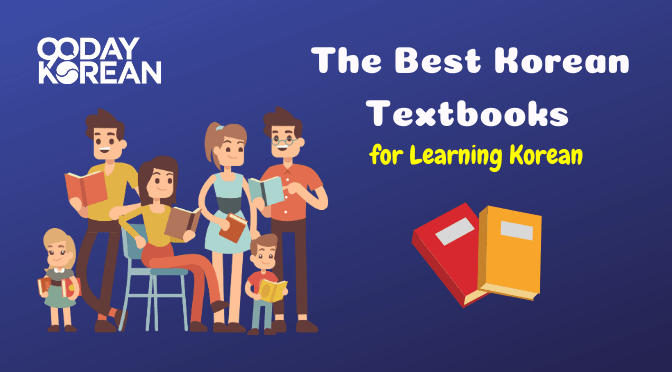
Below is a free PDF guide that you can download and take with you:
Contents
- 1 List of Korean Textbooks for Self-study
- 1.1 Korean Made Simple
- 1.2 Active Korean
- 1.3 Integrated Korean
- 1.4 Korean Made Easy
- 1.5 Sogang Korean
- 1.6 Yonsei Korean 1 (English and Korean Edition)
- 1.7 2000 Essential Korean Words
- 1.8 Korean for Beginners: Mastering Conversational Korean
- 1.9 Elementary Korean
- 1.10 Ewha Korean
- 1.11 Once Upon a Time in Korea
- 1.12 Learning Korean Through Traditional Fairy Tales
- 1.13 Korean Grammar for International Learners
- 1.14 Korean From Zero!
- 1.15 Korean Slang: As Much as a Rat's Tail
- 2 Korean Textbooks: So Many Choices!
- 2.1 Identify Your Focus
- 2.2 Choosing A Korean Textbook
- 2.3 Stick to Your Choice
- 3 What About TOPIK?
- 4 Do I need a Korean Tutor?
- 5 Where to Buy Korean Books
- 6 A Goal Without a Plan is Just a Wish
List of Korean Textbooks for Self-study
Below are some of the best textbooks for learning Korean that are currently available. We've included an explanation of the type of student that they are likely to be best for. These Korean language books are not ranked in any particular order.
Let's get to it!
Korean Made Simple
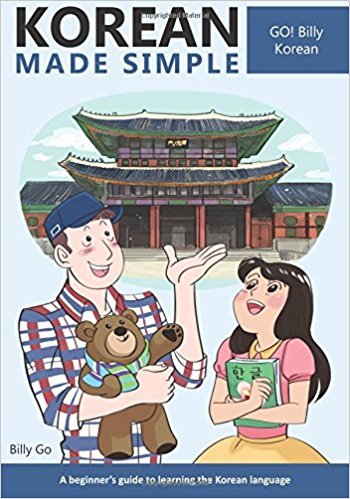
This textbook is best for beginners who have just started to learn Korean. It's very easy to follow and has some basic grammar and reading sections. You will be able to learn quite a lot early on as the lessons focus on modal verbs and questions first.
Because of how the book is segmented, it works best for learners that need some assistance structuring their studying. You won't have to bounce around sections or "go with the flow" if you commit to studying this book.
If you want to reach a decent level of Korean language ability quickly such as grammar and vocabulary, then this book would be useful. Its grammar lessons are in-depth and easy to understand.
However, there may be a little bit too much in the way of explanation in some areas, particularly the section about learning basic Hangul (the Korean Alphabet).
Feel free to skim some of the more detailed lessons if you feel like you're not getting anything out of them — they're very interesting and can sometimes help you remember concepts by providing context that you'll remember, but they're not the best thing to focus on unless you want some additional knowledge.
Korean Honorifics aren't tackled until the second textbook (Korean Made Simple 2) which helps prevent confusion early on. It was published in 2014 so it has up-to-date content and will provide you with relevant examples of conversation.
There is no audio with any of these textbooks, but you can download MP3 files for free on the author's website. There are levels 2 and 3 for this series, as well as a workbook.
Active Korean

This series goes all the way up to the lower intermediate level, so it's good for anybody studying Korean for the long haul. Although the lessons are very clear, it works best if you have a tutor to help you when using it.
It was started by the Seoul National University Language Institute, so you can be sure it's one of the best Korean books out there.
All of the material inside the book has been thoroughly tested before publication, and the reading content has been well thought out.
If you are learning Korean on your own, then this book is easier to use than the Sogang series of books. You can be sure that you're receiving a quality textbook education due to the extensive thought and planning that went into putting it together.
However, the later textbooks cover some difficult grammar concepts (such as reported speech) a bit too quickly. Therefore, you need to be careful to ensure that you fully understand the basic Korean grammar fundamentals and have assimilated the content before moving on.
If you continue through the series and come across grammar content that you don't fully understand with the textbook explanation alone, you should consider supplementing your studying with online and video resources that can help you understand higher-level grammar concepts better.
Integrated Korean

This foreign Korean textbook was written by the University of Hawaii and is used to teach Korean grammar lessons at SOAS (the leading U.K. school for Korean Studies).
Audio is not included, but you can download it for free from the author's website.
It can be used on its own without a tutor since it explains everything in detail, but it may feel too stuffy and academic for some Korean learners.
Some of its content also is outdated, and some rarely used Korean words, phrases, and expressions pop up more often than they should. If you're interested in a textbook that focuses on more modern conversation and current Korean cultural trends, consider a different textbook.
However, this Korean textbook is still a solid choice for any motivated self-learner.
Korean Made Easy
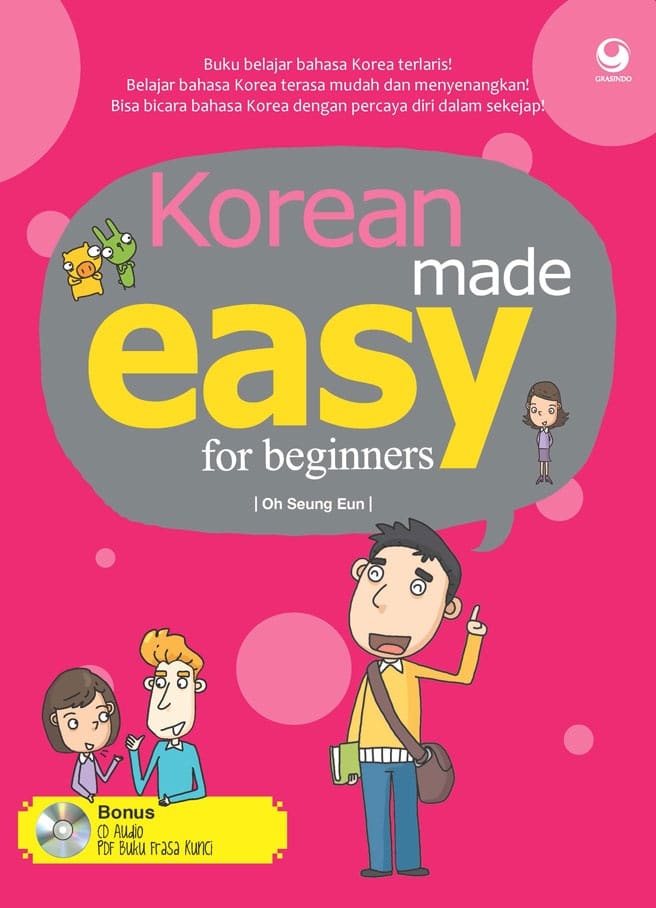
Designed for self-study, this textbook has great reviews and is well thought out. The author taught at Sogang University and also started several of the Sogang textbooks.
This book is easy to use and is a good choice for beginners, especially if you prefer to work through a textbook without skipping around from section to section. It covers common Korean words and grammar concepts for everyday conversation.
The listening and reading sections are based on the KLPT (Korean Language Proficiency Test), so this could be a great companion textbook for anyone preparing for the exam.
Sogang Korean

This series consists of some of the best books to learn Korean. These Korean textbooks are highly regarded and will take you from beginner to advanced. If you have a tutor and ample time on your hands, then these are the books for you! Many Korean students get started with this series.
There are twelve levels (1A up to 6B), each with a Korean language workbook. That means there are plenty of lessons and content to get you to an advanced level in Korean.
Sogang lessons focus on speaking, and these Korean textbooks are designed to be used with a tutor or in a small class. As a result, they may not be the best choice if you're planning on learning Korean by yourself. It's hard to nail correct grammar and pronunciation of Korean words if you don't have a tutor to practice it with.
It's also best to listen to spoken Korean when you're working with a tutor rather than watching videos and listening to dialogue that way. You just can't break down the conversation you just heard in the same way if you're watching a video compared to a teacher.
These Korean books don't contain a writing section as this was only added recently to the Sogang University course itself.
However, they're still very extensive and a great series to commit to for serious Korean learners. Consider supplementing the textbooks with an additional Korean writing resource rather than passing them up altogether.
Yonsei Korean 1 (English and Korean Edition)
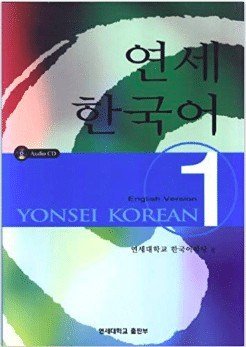
Also amongst the best textbook series for those learners who are getting started in Korean, Yonsei Korean is a series of textbooks developed and created by the Korean Language Institute at Yonsei University. Yonsei is one of the best and top universities in Korea.
The institute's primary aim is the study and teaching of the Korean language. These books aim to help students develop well-rounded abilities in Korean communication.
They provide lessons and exercises that target listening, speaking, reading, sentence structure, and writing skills. Aside from the communicative skills that are targeted in these Korean books, the Yonsei series also incorporate lessons on learning about Korean culture. If you are interested to learn Korean culture alongside learning the Korean language, then this Yonsei book series will best suit you.
Because of their academic nature, these Korean language books are best used in a Korean classroom environment or with a tutor. Its lessons are packed chock full o' vocabulary words and grammar concepts.
The beauty of Yonsei Korean is the continuity of the Korean language learning that it provides to students. The Yonsei Korean textbooks are made up of 12 books divided into 3 language levels: beginner, intermediate, and advanced.
If you are learning Korean at a beginner level, the Yonsei Korean 1 and 2 textbooks are best for you. Each textbook is made up of 10 units with 5 lessons each. Lessons in these textbooks are highly focused on the essential Korean grammar and vocabulary that will help students to develop a basic understanding of the Korean language.
Once you complete the beginner levels, Yonsei Korean 3 and 4 are available for intermediate level and Yonsei Korean 5 and 6 for the advanced level after that. This Korean language series is a complete curriculum of lessons that are useful in helping students learn to communicate in Korean.
2000 Essential Korean Words

This is one of the best books for learning vocabulary words. It's not specifically a Korean language textbook. This book is best for learning Korean in conjunction with a quality grammar-based textbook. You may also want to pair this book with the '2000 Essential Korean Words' list on Memrise.com to boost your vocabulary.
It contains many vocabulary words that don't translate easily into English so it's a useful tool for giving yourself a solid Korean vocabulary base.
If you've recently found yourself trying (and struggling) to translate a phrase or vocab word into Korean from English (or vice versa), this may be one of the best books to have by your side.
Korean for Beginners: Mastering Conversational Korean

While most textbooks start with "My name is Steve, I'm a student, I'm from England", the actual first bit of language learning you are likely to need is going to revolve around ordering food or finding the bathroom.
The fact that this Korean language textbook starts by talking about food is a welcome relief. It also covers Korean emoticons rather early on (before teaching Hangul, the Korean alphabet) and is written with a sense of humor.
Not necessarily the best textbook for a structured approach to learning Korean, its lessons are designed more around getting you up and running in the Korean language quickly with sentences you'll be using from day 1 in Korea.
Elementary Korean

Like "Integrated Korean", this textbook has more of an academic feel to it so doesn't score high on the fun meter. Although it was published quite recently, most of the book was actually written around two decades ago!
It still tops the "best Korean language textbook" lists because of how well-structured the lessons are and how thorough they can be without being too wordy.
It's a great starter textbook for Korean language learning and a strong foundation in grammar.
Ewha Korean

This series of textbooks published by Ewha Women's University in South Korea covers six levels of fluency, from those just getting started to the advanced. So if you decide to invest your time studying Korean you'll have five subsequent books to take you step-by-step through your Korean language journey.
The Ewha textbooks are some of the best for self-study. Every aspect of the book is designed in a clever and well-thought-out way that can be enjoyed without a tutor.
From the table of contents to the illustrations and explanations used to introduce and explain concepts, these books were designed for a self-starter that wants to learn Korean fast, but the right way.
One thing that sets this particular textbook apart from others is that rather than dividing up sections based on grammar, tenses, and other aspects of Korean language learning, the book is divided into real-world scenarios that you'll encounter, like making a daily schedule and making meals.
Then you learn different things about the Korean language through activities, exercises, and conversations centered around these various tasks. The flow of the book is very narrative, so it's great for readers that get bored with Korean textbooks that are too dry.
Consider investing in this textbook if you want to practice speaking Korean but you don't have a tutor — there are very brief "try what you learned" speech sections at the end of each chapter that give you an opportunity to try out the phrases and expressions you've been reading.
Once Upon a Time in Korea

The Once Upon a Time in Korea textbook is one of the best textbooks for learners that are just beginning to venture into learning Korean. It could also be a great choice for learners that aren't entirely committed to learning Korean.
The book is fun, colorful, and anything but boring, so it does a great job enticing readers that are true beginners or readers that are on the fence about committing to their Korean language learning journey. You just won't want to put it down!
Rather than being structured around different aspects of the Korean language, this book uses the unique approach of centering each of its sections around a different story from Korean folklore.
Folklore is a great way to become familiar with a new culture because you're not only exposed to the language that the story is written in, but also the morals and values that are being passed on for generations through the story. This can reveal important aspects of Korean culture that will provide some interesting context in your studies.
Learning Korean Through Traditional Fairy Tales

If you're not a fan of straightforward vocabulary lists and you want to experience a little bit of magic while you're studying, this is the textbook for you!
It's way easier to feel motivated to sit down and learn Korean when you're following a story, so this textbook's ability to weave traditional Korean fairy tales with concise and pointed language direction is a great introduction to learning Korean and keeping you motivated.
This textbook also has an interesting approach to introducing new vocabulary that helps ensure the learner will retain the information.
Rather than listing a Korean word and a definition side by side (which, face it, makes it easy to quickly forget a vocab word), this textbook introduces a new vocabulary word by providing context to help the reader guess the meaning of the word.
Then, after providing the meaning of the vocab word, there is an exercise that asks the learner to practice the pronunciation of the vocab. It'll definitely be hard to forget new vocabulary after that!
Korean Grammar for International Learners
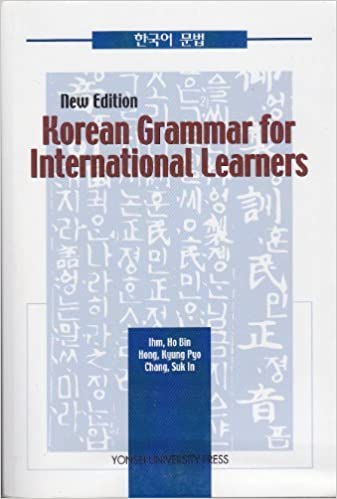
A bit different from the other Korean language learning textbooks on this list, the primary focus of this textbook series is a deeper understanding of how the language works.
This Korean grammar book is definitely not for those who want to get up and running in Korean as quickly as possible, but it's an invaluable reference for those who want a complete understanding of Korean sentences.
This also isn't a beginner textbook, and you should only move on to this series after you know the basics of Korean, or at least can read Hangul (there is no romanization).
While the book is a bit short on explaining grammar points in detail, it makes up for that in an abundance of example sentences! This helps give a better sense of when, and how, different Korean grammar would appear in use.
Although not the textbook to start with, as you progress in Korean learning and want to become more fluent in the Korean language you'll need a good reference textbook. They don't get much more comprehensive than this series.
Korean From Zero!
This series of Korean language books are available in both Kindle and paperback format. One of the best things about Kindle books is that you can first download a sample of the book and see if it's a good match for you.
The Kindle version has pages, notes, and flashcards, which are nice features to personalize your study experience. The book could be good for you even if you know how to read Hangul already. The text guides you and suggests you skip pages if you already know the Korean alphabet.
Audio is included, making this an all-around good book to start out with and learn the foundations. There are volumes 2 and 3 as well if you want to continue studying using this series.
Korean Slang: As Much as a Rat's Tail
This is one of the best books to learn Korean slang. It's useful once you're comfortable with basic Korean sentences and have a solid foundation of grammar. We recommend using this once you're at least at a high beginner level. It's a good supplement to a structured textbook or course to add some fun words to your vocabulary.
You can get this book in both Kindle and paperback format. The digital version is really nice if you want to live a minimalist life or take it with you as you travel. The paperback works well if you are the type of person who likes to take notes.
Korean Textbooks: So Many Choices!
Now that we've listed the best books to learn Korean, the next thing is to determine which one is best for you? With the explosion of popularity of all things Korean and interest in the country itself, there is a huge selection of new Korean textbooks written by some of the very best teachers out there.
However, many books are just reprints of older textbooks that let you learn very traditional Korean. That means they wouldn't be the best choice because they may be out-of-date or overly formal. The Korean language is wrapped up in the culture, so the best Korean textbooks help you learn the cultural nuances of the language, along with the language itself.
For example, there are about half a dozen different ways to say "thank you" in Korean. It's important to know which one is best to use so you sound polite and not offensive. The right book will help you with that.
Identify Your Focus
Another thing to think about is why you're learning Korean. If you've decided that taking a course is best for you, then you can follow the structure laid out for you. However, if you're starting out on your own, you'll need to best understand how you learn to keep you motivated.
For example, if you want to be able to just talk in Korean, then grammar-focused Korean books will not be the best choice. On the other hand, if you want to gain a more academic understanding of the Korean language, then a conversation book will probably leave out details you care about. Studying what you will use helps maintain your motivation to learn Korean. Identifying your focus will help you determine what kind of resources that best fit your language learning needs.
Choosing A Korean Textbook
It's best if you can preview the contents of a textbook before buying it. You might also choose something recommended by someone you trust or who learns in a similar way to you. Choosing the wrong textbook will frustrate you or put you to sleep.
Also, consider how long you intend to learn Korean. Do you want to just spend a few months learning so you can get around on a short trip to Seoul, or want to become fluent enough to understand K-pop and K-dramas without translation?
While a longer series may divide concepts into several volumes spanning months or years of study, a standalone or beginner book may cover everything you'd want to know in a shorter period. Think about how long you want to learn and what level you want to get to at that time.
Stick to Your Choice
Once you choose a textbook series, it's best to stick with that series in order to learn Korean effectively. Textbooks often have a planned out roadmap for what you'll learn and when. Mixing different Korean books can make you study topics you've already learned, or it may confuse you with the order of contents.
If you plan to study Korean for a while then it's best to choose a series of books that go up to the level you want to reach. You can always switch to another series later when you understand Korean (and your own study habits) better.
Can't read Korean yet? Click here to learn for free in about 60 minutes!
What About TOPIK?
You may have noticed that there are no textbooks mentioned that focus on the TOPIK Korean language test. The TOPIK is the Test of Proficiency in Korean. It's the official test used for gauging a non-native's level in Korean in business and academia.
If your goal is to score highly on the TOPIK, then you'll be studying very differently than you would if studying for fluency. You would be best off studying for the test itself and the types of questions you'd encounter. An example of this would be to download the previous year's tests and study those.
The TOPIK test, at high levels, will have questions on Korean vocabulary and grammar that you'd likely rarely (or never) encounter in daily life. The assumption is that if you know that level of Korean, you would already be familiar with the simpler aspects of the language. Even native Korean speakers can get a poor score on the TOPIK if they're not prepared for it.
Also, the TOPIK test questions change every year, rendering most Korean books on the market out-of-date (you have been warned!).
Do I need a Korean Tutor?
Some of the textbooks work best if you have a Korean tutor to help you explain some of the concepts. That's because some of them were written to be taught in a classroom setting.
If you don't have a Korean tutor and want some help with learning the language, then check out the 90 Day Korean Inner Circle. It's a structured online course that will teach you how to have a 3-minute conversation in the first 90 days. Membership includes personal coaching and live training.
Where to Buy Korean Books
You can order them up at Amazon or Kyobo Bookstore. We provide the Amazon link in the description above, where available. You can also go to Kyobo Bookstore and pick them up in person if they have the books in stock.
A Goal Without a Plan is Just a Wish
Remember, before choosing a textbook, it's best to have a plan for how you'll study. The best textbook in the world won't help you learn Korean if you don't study it regularly.
Keep in mind that some textbooks are designed for self-study while others are best used in Korean classes or with a tutor. Consider how comprehensive the textbook is, and how much support you might need to answer questions about it before you decide to add it to your study plan.
Most importantly, choose a book with content that will keep you interested and engaged. You'll be a lot more effective at learning Korean when you can enjoy the process. Eventually, you'll find yourself able to read books on Korean history, Korean novels, historical fiction, or Korean literature too!
This list of the best Korean textbooks is by no means every textbook out there, and most language schools produce their own textbook. Of course, as well as using a textbook, you can study Korean in other ways such as enrolling in a university course or online course. Here is a fantastic way to get started.
Textbooks for learning Korean are also good gift ideas for oneself and for others who wish to learn Korean. You may also give yourself or other language learners you know a Korean gift card for an online course.
Do you have a favorite textbook that you use to learn Korean? What is your pick among the best books to learn Korean? Let us know in the comments below!
And best of luck with your Korean language learning adventures!
Posted by: devondevonvaranoe0271545.blogspot.com
Source: https://www.90daykorean.com/best-korean-textbooks/
Post a Comment